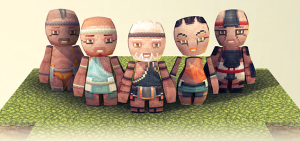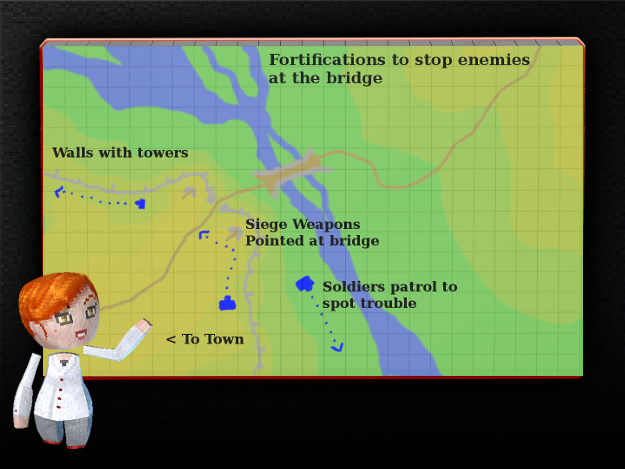
Last time we talked about being a soldier, doing the hands-on business of war. This time, we go into the big-picture job of high-ranking military officers.
General Mode à la Mode
“General Mode” is a separate mode from the first-person viewpoint players usually take. Players enter General Mode by using specific interface core blocks, such as a “general’s desk” or a “war map”. In general mode, players are put into a third-person perspective, similar to the mayor’s mode. As a third-person top-down view where you control multiple units, General Mode could also be considered “Real-time Strategy Mode”.
However, unlike a pure RTS game, the nature of Imagine Nations makes large-scale combat significantly different. Mostly, rather than the rapid deployment of “factories” that produce units for as long as you have resources, Imagine Nations, being a culture-focused game, will have towns and cities you, as a military leader will likely have no control over (barring a military leadership) to produce the military units you have to work with. You have a smaller supply of named individuals with a place to return to in your armies (and possibly jobs they perform when not in the military), rather than generic units whose only purpose is war.
War is also different from a standard RTS in that an officer is not in a “deathmatch” against a single other general, where you are tasked with “winning” by destroying the other side. Rather, you are tasked with “not losing” by preventing your own culture from being destroyed, as the game does not end with the destruction of an enemy. When it comes to conflict between nations, the difference between “crushing the enemy” and “pushing them to a lasting peace” may not appear very different, but for the amount of land you wind up having to defend from the next threat.
As such, there are several roles an officer fulfills:
Man-Woman-Genderless-Asexual-Being-And-Everything-In-Between the Trenches!
An officer on the field can give direct orders to soldiers, again, similar to an RTS, but also is functionally in charge of peace-time operations, as well. This means that they are functionally creating the patrol missions non-commissioned soldiers go on. They will give orders to get certain-sized units together, and perform patrols, or have a reserve unit and some scouts to sweep for trouble, or to build up fortifications and bases for future military actions.
I Want A Wall of Sand Between…

One of the other major duties in General Mode is building the defensive structures for your culture. Controlling the landscape you fight upon is controlling the flow of battle. Players can dig moats, block canyon passes, erect castles or city walls, build arrow slits or bunkers for ranged defenders, force the only entrances to go through narrow gatehouses, and otherwise prepare for the inevitability of armed conflict.
Also on the “engineering” front, military players can try their hand at blueprinting weapons of war, and trying to get their vehicles and weapons, or modifications of vehicles and weapons, mass-produced for their own or widespread use. (The success of such efforts depending on the political situation.)
I Don’t Know, But I’ve Been Told…
To go into more detail on the nature of the more individual-level of the game’s detail, soldiers in this game are going to be individual citizens who join the ranks of the military for one reason or another. As such, overseeing the training the recruits and furthering the specializations of career soldiers will be another role of an officer.
Imagine Nations has a train-through-use skill system, where player characters and NPCs get better at the things they do as they use them. Military drills or live action raise combat skills, making veterans more valuable, and emphasizing players train specialists in the skills they will need, as well as replacement specialists for the inevitable deaths or retirements. Subordinates (and superiors) have stats like the player does, and can have relationships for better or worse with one another. Managing the unit to keep it on task is an important officer’s role.
As the player climbs the ranks, and the game scales upwards in how many total troops they control, and the game abstracts out lower ranks. A lieutenant may have direct control on a per-soldier level, but a general of a large nation may only directly order officers down to majors. The individual soldiers become “faceless” from the General Mode to keep the number of “pieces on the board” low enough to be manageable. A platoon or company might be a single unit whose stats and orders are tied directly to their officer and an abstract training stat.
- Imagine Nations Team
Notes: As our crowding campaign for Imagine Nations continues, We released the game launcher for the Backers to test. Get Backer’s Access!


Beating the enemy until they ask for peace? seems legit.
This comment is currently awaiting admin approval, join now to view.